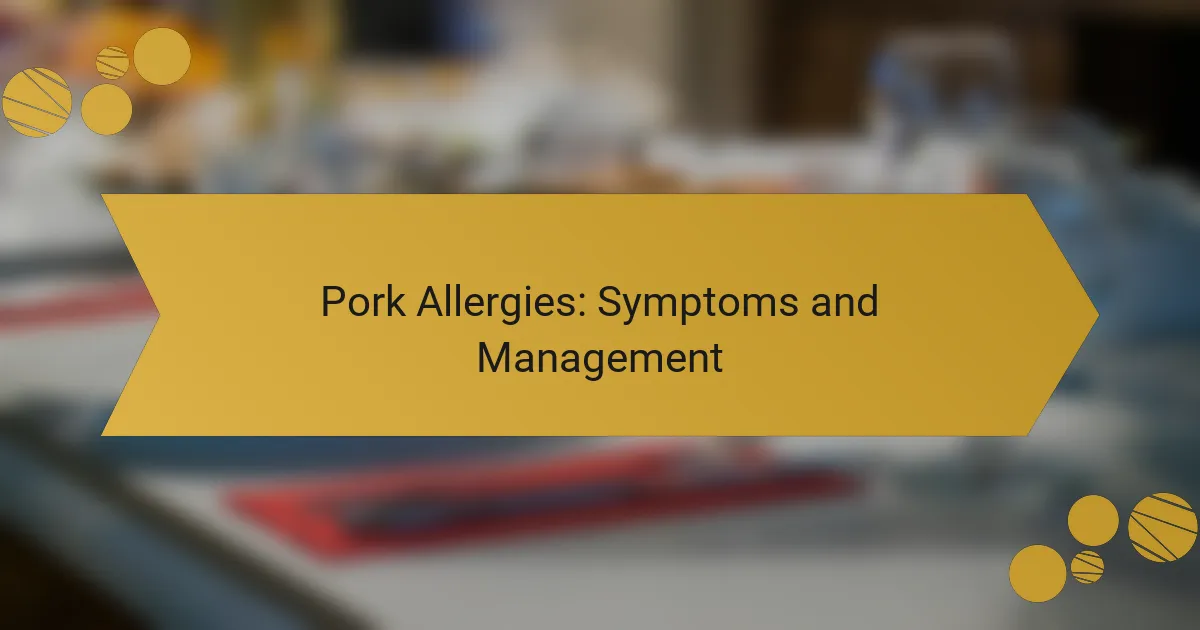
What are Pork Allergies?
Pork allergies are immune system reactions to proteins found in pork meat. Individuals with this allergy may experience symptoms like hives, stomach cramps, or difficulty breathing after consumption. The allergy can occur due to the presence of specific allergens, such as albumin and other proteins. Diagnosis typically involves skin tests or blood tests to identify reactions to pork proteins. According to a study published in the Journal of Allergy and Clinical Immunology, pork allergies can manifest in individuals with other food allergies. This highlights the importance of recognizing and managing the condition effectively.
How do Pork Allergies develop?
Pork allergies develop when the immune system mistakenly identifies proteins in pork as harmful. This triggers an immune response, leading to allergy symptoms. The proteins involved can vary, but often include albumin and myosin. Genetic predisposition plays a role in the likelihood of developing this allergy. Exposure to pork can sensitize individuals, causing their immune system to react upon subsequent exposures. Cross-reactivity with other allergens, such as certain meats or environmental factors, may also contribute. Studies indicate that pork allergies are more common in individuals with other food allergies. The prevalence of pork allergy is relatively low, but cases have been documented in various populations.
What causes the immune response in Pork Allergies?
The immune response in pork allergies is primarily caused by the body’s immune system mistakenly identifying proteins in pork as harmful. This misidentification triggers the production of specific antibodies, particularly Immunoglobulin E (IgE). Upon subsequent exposure to pork, these antibodies activate immune cells, leading to the release of histamines and other chemicals. This process results in allergic symptoms, which can range from mild to severe. Studies show that certain proteins, such as albumin and myoglobin found in pork, are common allergens. These proteins can provoke an immune response in sensitized individuals, causing the symptoms associated with pork allergies.
Are there genetic factors involved in Pork Allergies?
Yes, there are genetic factors involved in pork allergies. Research indicates that certain genetic predispositions can influence the likelihood of developing food allergies, including pork. For example, individuals with a family history of allergies may have a higher risk of developing pork allergies. Additionally, specific genes related to immune response, such as those affecting IgE production, may play a role. Studies have shown that genetic variations can impact how the immune system reacts to allergens in pork. This suggests that genetics can be a significant factor in the development of pork allergies.
What are the common symptoms of Pork Allergies?
Common symptoms of pork allergies include hives, itching, and swelling. Individuals may also experience gastrointestinal issues such as nausea, vomiting, or diarrhea. Respiratory symptoms like nasal congestion, sneezing, and difficulty breathing can occur. In severe cases, anaphylaxis may develop, which is a life-threatening reaction. Symptoms typically appear within minutes to hours after consuming pork. Studies indicate that pork allergies can be linked to specific proteins found in pork meat.
How do symptoms vary among individuals with Pork Allergies?
Symptoms of pork allergies can vary significantly among individuals. Some may experience mild reactions such as hives or gastrointestinal discomfort. Others may have more severe symptoms, including anaphylaxis, which can be life-threatening. Reactions can include respiratory issues like wheezing or difficulty breathing. The onset of symptoms can also differ, occurring within minutes to hours after consumption. Individual sensitivity levels play a crucial role in symptom severity. Genetic factors and coexisting allergies can influence how one reacts to pork. Research indicates that the presence of specific antibodies can correlate with symptom intensity. Overall, the variability in symptoms highlights the importance of personalized management strategies for those with pork allergies.
What are the immediate reactions to Pork Allergies?
Immediate reactions to pork allergies can include hives, swelling, and gastrointestinal distress. These symptoms may occur shortly after consuming pork. Skin reactions like hives or eczema are common. Swelling of the lips, face, or throat may also happen. Gastrointestinal symptoms can include nausea, vomiting, or diarrhea. In severe cases, anaphylaxis may occur, leading to difficulty breathing and a drop in blood pressure. This can be life-threatening and requires immediate medical attention. Studies indicate that food allergies, including pork, can trigger these acute responses in sensitized individuals.
What are the delayed symptoms associated with Pork Allergies?
Delayed symptoms associated with pork allergies can include gastrointestinal issues, skin reactions, and respiratory problems. Gastrointestinal symptoms may manifest as abdominal pain, nausea, or diarrhea. Skin reactions can include hives, eczema, or itching. Respiratory symptoms may involve nasal congestion, sneezing, or asthma-like symptoms. These symptoms can appear several hours after consuming pork. Studies indicate that delayed reactions occur due to the immune system’s response to specific proteins in pork.
How are Pork Allergies diagnosed?
Pork allergies are diagnosed through a combination of medical history, physical examination, and allergy testing. The healthcare provider will first review the patient’s symptoms and dietary habits. They may inquire about any reactions to pork consumption. Skin prick tests can be conducted to check for allergic reactions to pork proteins. Blood tests may also be performed to measure specific IgE antibodies related to pork allergies. These diagnostic methods help confirm the presence of an allergy to pork. Accurate diagnosis is crucial for effective management and avoidance strategies.
What tests are used to confirm a Pork Allergy?
Skin prick tests and blood tests are commonly used to confirm a pork allergy. Skin prick tests involve placing a small amount of pork protein on the skin and monitoring for a reaction. Blood tests measure specific IgE antibodies to pork proteins. Both tests help determine if a person has an allergic response to pork. These methods are supported by clinical guidelines from allergy organizations.
How can one differentiate between Pork Allergies and other food allergies?
Pork allergies can be differentiated from other food allergies through specific symptoms and testing. Common symptoms of pork allergies include hives, gastrointestinal issues, and respiratory problems. These symptoms typically occur shortly after consuming pork. In contrast, other food allergies may present different symptoms or have varied onset times.
Skin prick tests and blood tests can confirm a pork allergy. These tests measure the immune response to pork proteins. A medical professional can provide a proper diagnosis based on these tests. Additionally, a detailed dietary history can help identify reactions specifically related to pork.
Research indicates that pork allergies may be linked to specific proteins not found in other foods. For example, the protein alpha-gal is associated with mammalian meat allergies. Understanding these distinctions can aid in accurate diagnosis and management of food allergies.

What management strategies exist for Pork Allergies?
Management strategies for pork allergies include strict avoidance of pork products. Individuals should read food labels carefully to identify hidden pork ingredients. Cross-contamination should be prevented by using separate cooking utensils and surfaces. Consultation with an allergist can provide personalized advice and management plans. Emergency action plans should be developed for accidental exposure. Antihistamines may be recommended for mild reactions. In severe cases, carrying an epinephrine auto-injector is crucial. Regular follow-ups with healthcare providers can help monitor the allergy and adjust management strategies as needed.
How can individuals avoid pork products?
Individuals can avoid pork products by carefully reading food labels and ingredient lists. Many processed foods contain pork derivatives, such as gelatin or enzymes. Choosing fresh, whole foods like fruits, vegetables, and grains minimizes the risk of pork contamination. When dining out, individuals should inform restaurant staff about their dietary restrictions. They can request meals without pork or inquire about food preparation methods. Additionally, individuals should avoid common pork products like bacon, ham, and sausages. Awareness of cross-contamination in kitchens is also crucial. Following these guidelines helps ensure that individuals successfully avoid pork products.
What are common sources of pork in food products?
Common sources of pork in food products include bacon, ham, sausage, and pork chops. These items are derived from various parts of the pig. Processed meats often contain pork as a key ingredient. Pork is also found in many ready-to-eat meals and snacks. Additionally, pork fat is used in cooking and baking. Some sauces and seasonings may contain pork-derived ingredients. Pork is prevalent in many cuisines worldwide, contributing to its widespread use in food products.
How can one read labels effectively to identify pork ingredients?
To read labels effectively and identify pork ingredients, focus on ingredient lists and allergen statements. Ingredients derived from pork include terms like “pork,” “ham,” “bacon,” and “lard.” Look for additives such as “gelatin” or “enzymes,” which may also originate from pork. The FDA mandates clear labeling for allergens, so check for specific allergen warnings. Products labeled as “natural flavoring” may contain pork derivatives, so inquire further if unsure. Always verify with manufacturers if the source of ingredients is ambiguous. This method ensures accurate identification of pork in food products.
What treatment options are available for Pork Allergies?
The primary treatment option for pork allergies is strict avoidance of pork products. Individuals with this allergy should read food labels carefully to avoid hidden sources of pork. In cases of accidental exposure, antihistamines can help relieve mild allergic symptoms. Severe reactions may require the use of an epinephrine auto-injector. Consulting an allergist is essential for personalized management strategies. Allergy testing can confirm the diagnosis and help identify cross-reactive allergens. Education on food substitutions is also vital for maintaining a balanced diet. Regular follow-ups with healthcare providers ensure effective management of the condition.
How can antihistamines help in managing symptoms?
Antihistamines can help in managing symptoms of pork allergies by blocking the action of histamine in the body. Histamine is released during allergic reactions and contributes to symptoms such as itching, hives, and nasal congestion. By inhibiting histamine, antihistamines can reduce these uncomfortable symptoms. Studies have shown that antihistamines are effective in alleviating allergic reactions. For instance, a study published in the Journal of Allergy and Clinical Immunology found that antihistamines significantly decreased itchiness and hives in allergic patients. Therefore, antihistamines serve as a useful option for symptom relief in individuals experiencing pork allergies.
What role do emergency medications play in severe reactions?
Emergency medications play a critical role in managing severe reactions, such as anaphylaxis, associated with pork allergies. These medications, such as epinephrine, rapidly counteract life-threatening symptoms. Epinephrine works by constricting blood vessels, increasing blood pressure, and reducing swelling. It also relaxes airway muscles to improve breathing. Timely administration of epinephrine can be life-saving during a severe allergic reaction. According to the American Academy of Allergy, Asthma & Immunology, immediate treatment with epinephrine is essential for effective response. Delays in treatment can lead to serious complications or fatalities. Therefore, having emergency medications readily available is vital for individuals with pork allergies.
Are there lifestyle changes that can aid in managing Pork Allergies?
Yes, lifestyle changes can aid in managing pork allergies. Individuals with pork allergies should avoid consuming pork and pork-derived products. Reading food labels is essential to identify hidden sources of pork. Cross-contamination should be minimized by using separate cooking utensils. Maintaining a balanced diet can help support overall health. Consulting with an allergist provides personalized management strategies. Keeping an emergency plan, including access to antihistamines, is crucial. Regular follow-ups with healthcare providers ensure ongoing management of the allergy.
What dietary adjustments should be made for someone with a Pork Allergy?
Individuals with a pork allergy must avoid all pork products. This includes bacon, ham, and sausage. They should also read food labels carefully. Many processed foods may contain pork-derived ingredients like gelatin or enzymes. Cross-contamination is a risk, so separate cooking utensils are essential. Informing restaurants about the allergy is crucial when dining out. Alternatives to pork include chicken, turkey, and plant-based proteins. These adjustments help prevent allergic reactions and promote overall safety.
How can one communicate their allergy effectively in social situations?
To communicate a pork allergy effectively in social situations, clearly state the allergy when introducing yourself. Use direct language, such as “I have a pork allergy.” This ensures that everyone understands the seriousness of the condition. Mention specific foods to avoid, like pork dishes or ingredients containing pork. It is helpful to inform the host or organizer ahead of time. This allows them to prepare safe options. When dining out, ask about menu items and how they are prepared. Always carry an allergy card or medical alert bracelet. This provides essential information in case of an emergency. By being proactive, you can help ensure your safety in social settings.

What are the long-term considerations for those with Pork Allergies?
Long-term considerations for those with pork allergies include the risk of anaphylaxis and dietary restrictions. Anaphylaxis can occur with exposure to pork, leading to severe allergic reactions. Individuals must avoid all pork products to prevent such reactions. Cross-contamination is a concern, as pork may be present in processed foods or shared cooking equipment. Nutritional deficiencies may arise due to limited food choices. Regular consultation with an allergist is essential for management. Allergy testing may be necessary to monitor changes in sensitivity. Education on reading labels and identifying hidden pork ingredients is crucial for safety.
How can one cope with the emotional impact of a Pork Allergy?
Coping with the emotional impact of a pork allergy involves several strategies. First, individuals should seek support from friends, family, or support groups. This social support can alleviate feelings of isolation. Second, educating oneself about the allergy can empower individuals. Understanding triggers and symptoms helps in managing anxiety. Third, engaging in mindfulness practices can reduce stress. Techniques such as meditation or deep breathing are effective. Fourth, consulting with a mental health professional can provide coping strategies. Therapy can help address feelings of frustration or sadness. Lastly, maintaining a balanced diet and healthy lifestyle can improve overall well-being. A nutritious diet supports emotional health, which is crucial for coping.
What support resources are available for individuals with food allergies?
Support resources for individuals with food allergies include educational materials, support groups, and professional guidance. Organizations like the Food Allergy Research and Education (FARE) provide comprehensive information on food allergies. FARE offers resources such as online courses, webinars, and community forums. Local support groups can connect individuals with similar experiences. Healthcare professionals, including allergists, offer personalized advice and management plans. Schools often provide resources to help manage allergies in educational settings. Additionally, mobile apps can assist with ingredient scanning and food safety.
What tips can help in managing Pork Allergies effectively?
Avoid consuming pork and pork-derived products to manage pork allergies effectively. Read food labels carefully to identify hidden pork ingredients. Inform restaurants and food providers about your allergy to prevent cross-contamination. Carry antihistamines or an epinephrine auto-injector for emergency situations. Consider consulting an allergist for personalized management strategies. Regularly monitor for new symptoms, as allergies can evolve. Educate family and friends about your allergy for better support. Keeping a food diary can help track reactions and identify triggers.
How can meal planning assist in avoiding pork products?
Meal planning assists in avoiding pork products by allowing individuals to prepare meals in advance that exclude pork. It enables the selection of recipes that specifically do not include pork as an ingredient. By creating a shopping list based on these recipes, individuals can avoid purchasing pork products. Meal planning also helps in identifying alternative protein sources, such as chicken or tofu. This proactive approach reduces the likelihood of accidental consumption of pork. Studies indicate that careful meal preparation can significantly lower exposure to allergens. Thus, meal planning is an effective strategy for managing dietary restrictions related to pork allergies.
What are some best practices for dining out with a Pork Allergy?
Inform restaurant staff about your pork allergy before ordering. Clear communication is essential for safety. Request a separate preparation area to avoid cross-contamination. Many restaurants are willing to accommodate dietary restrictions. Review the menu carefully for hidden pork ingredients. Common items like broth, sauces, and processed foods may contain pork. Always ask about the ingredients in dishes that seem safe. Some dishes may have unexpected pork by-products. Choose restaurants known for accommodating food allergies. Establishments with allergy-friendly practices are often more attentive. Carry an allergy card that details your pork allergy. This can help communicate your needs clearly. Be cautious with shared plates or buffets. These can increase the risk of accidental exposure to pork.
Pork allergies are immune system reactions to proteins found in pork meat, leading to symptoms such as hives, gastrointestinal distress, and respiratory issues. The article explores the development, diagnosis, and management strategies for pork allergies, including common symptoms, genetic factors, and immediate reactions. It emphasizes the importance of avoiding pork products, effective communication in social situations, and the role of emergency medications in severe cases. Additionally, the article provides guidance on reading food labels, dining out safely, and coping with the emotional impact of living with a pork allergy.
